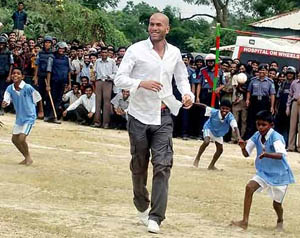After a brief encounter with the people at the door who refused to let me into the store, I attended Kepler’s second member appreciation night yesterday. Some of the employees presented their current book picks, and Al Jacobs gave a brief reading. People from Common Ground gave away plants. Obviously, the theme was gardening.
The store’s chief marketing officer, Anne Banta, said that Kepler’s Q1 revenue for 2006 is down from last year. Looking around, it wasn’t particularly hard to see why. The average age of people in the audience was over 60. That is a minor exaggeration at most. Relying on an aging population as your core customer base is a big problem for a bookstore–an independent bookstore with wildly fluctuating resources. This wouldn’t be a concern if Kepler’s sold hearing aids or walkers. People may become deaf or diasbled after they retire. They do not, however, become serious readers. Research shows that most people become serious readers in childhood and adolescence. Now, the question is, what, if anything, can Kepler’s do to create and hook these people on its store?
When I lived in New York, my two favorite stores were the Gotham Book Mart and St. Marks Bookshop. I can’t think of two more different independent bookstores in the country.
During the two years that I shopped at Gotham, I recognized every employee who worked there, and everyone recognized me. The store itself is fairly small, and is home to a cat named Thomas (after Pynchon) and a mess of books, which includes every significant work of fiction published during the past 100 years, and basically any literary journal you can think of. If they are missing something, it’s because it recently sold. (You won’t find twenty copies of the same title that’s only going to sell two.) You might not be able to find what you’re looking for, but I’ll guarantee you that the employees can.
The employees are largely what make this store great. (John Updike has called it his “favorite bookstore in North America.”) Although I think of myself as fairly well-read, the employees at Gotham must read about five times more than I do that because I would always walk out with books that one of them brought up during conversation and that I hadn’t even heard of when I entered the store. These people have recommendations and lots of them. Their literary prolificacy makes them trustworthy. They rave about books that haven’t even been released yet and then let you borrow the store’s advance copies to see for yourself. These people know their books, and they want to proactively share them with their customers. Did I mention that Gotham doesn’t even have a website?
Of course, the Gotham way of highly personalized customer service is not the only successful model I’ve observed in independent bookstores. About 10 minutes by subway from Gotham in the East Village is St. Marks Bookshop. This store is clean and well-lighted like Kepler’s. All the books there are on shelves, i.e. none are stacked on the floor. While Gotham closes early, St. Marks is open late. I have never seen a pet inside St. Marks. The management’s instructions to its employees can be summed up like this: “Customers know what they want. Do not talk to them. Do not approach them. Do not bother them. If they have questions, they will find you and ask.” The employees at St. Marks know their stuff, they just won’t share anything unless you ask them. The store has one of the best selections of fiction, art books, and critical theory that I have found anywhere. It does not carry self-help books, sports books, or computer books. It does not sell board games or toys. I’ve found the selection at Kepler’s increasingly disappointing, and it was not uncommon for there to be no copies of The Great Gatsby or the USA Trilogy or Pale Fire on the shelves for weeks at a time.
I don’t think that Kepler’s will or should adopt one model or the other entirely, but there are lessons to be learned from each about how you can build a loyal customer base. Kepler’s seems to think you can do this by letting people take our PBS-style memberships that will supposedly make them feel good about supporting a local institution. I have no problem supporting Kepler’s, and would gladly write them a check if I felt like the store was moving in the right direction. However, the literary journals that once lined the shelves between the front registers and the magazine racks have been replaced by children’s games. (Again, this–all these non-book items–seem to me a bid to compete with Borders in Palo Alto, which is probably a bad move. To stock items that have higher profit margins than books is an excellent idea, but to do so at the expense of your primary product is not such a good idea.
Moreover, in its expectation that customers–or members–treat it essentially as a non-profit, Kepler’s should adopt more of the responsibility and transparency to its members (donors) that comes with being a non-profit. Banta’s report that the store’s Q1 revenue for this year is below last year’s is vague, lacking hard numbers and unexplained. Are people buying fewer books? Fewer magazines? Is it because the store isn’t open as many hours during the week? Is it because the events have been poor?
Oh, the events. Last night a four-page market research survey was distributed to members. On it, I ranked events as the most important thing I want improved at Kepler’s. I’m aware that the store won’t compete in selection with Stanford or Cody’s or Green Apple, but they can–or at least could–compete on the strength of their author events. Last year at this time, I was looking forward to seeing Jonathan Safran Foer, Kazuo Ishiguro, and Phil Lesh all read at Kepler’s. I have looked at this year’s events calendar, and have essentially no interest in all but maybe–just maybe–one of the events. Meanwhile, I will be attending events that I am interested in at Booksmith, A Clean Well-Lighted Place, and Cody’s.
Of course, I should point out that my survey probably has very little value to people like Banta because I am 24 years old and spend thousands of dollars a year at independent bookstores. In other words, I am an anomaly. However, on the other hand, who better to listen to when deciding how to shape the future of Kepler’s than someone like me who is a serious reader–someone who buys and reads a large number of books; someone who has been to a lot of author events and bookstores all over the country; someone who has worked for both bookstores and book publishers–someone who cares deeply about Kepler’s? When I started this site to help save Keplers, I envisioned the store using its reopening as an opportunity to remake itself. I’m aware that not even half a year has elapsed yet since the reopening, and that to judge its progress at this point is probably unfair. However, to not judge at all would offer no chance for the improvement that I hope is still possible.
One final note, the April issue of Inc. magazine has the first in a series of articles by Bo Burlingham about the resurrection of Kepler’s. Burlingham was at the event last night and passed out copies of the magazine to Clark Kepler, others, and me. The cover slug for the story says, “Can the Best Minds in Silicon Valley Save an Old-Economy Business?” It’s nice to be called, hyperbolically, one of the best minds in the Valley, but I would much rather have Safran Foer or Ishiguro or Eggers or Lethem reading at Kepler’s.


